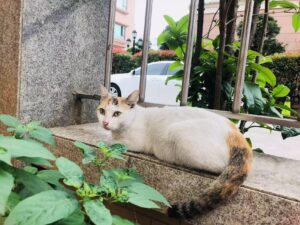Feline Infectious Peritonitis (FIP) is one of the most feared diseases in the cat community, aptly described as the “nightmare of every cat owner.” Recognized by the veterinary medicine community as one of the “top three feline fatal diseases,” FIP is notorious for its mortality rate, which can reach up to 99%, and the expensive medical costs associated with its treatment. Even if cat owners exhaust their finances for their furry friends’ treatment, recovery is not guaranteed.
FIP often strikes unexpectedly, causing immense physical suffering to cats and a devastating impact on the owners both emotionally and financially, often resulting in a “total loss of money and cat.”
What is FIP?
FIP, or Feline Infectious Peritonitis, is the result of a mutation of the feline coronavirus.

It commonly occurs in kittens between 3 to 9 months of age. The feline coronavirus resides in the intestinal tract of cats, and while most cats carry this virus and shed it through feces, it typically remains in the intestines and is harmless. However, when a cat is stressed and experiences a stress response, the virus can mutate and attack other organs.
Important note: While the feline coronavirus is highly contagious before it mutates, it loses its contagiousness after mutation, so cats with FIP do not need to be isolated.
What are the symptoms of FIP?
Cats have a high tolerance for pain caused by illness, so it is crucial for cat owners to be vigilant and learn to recognize the signs, especially since early detection of FIP is vital. Like many other serious diseases, early symptoms of FIP may not be obvious and could include sudden pickiness with food, lack of appetite, constipation, or extreme lethargy.
FIP can be categorized into “wet” and “dry” types, with the wet form presenting more obvious symptoms, such as fluid in the abdomen or chest. An enlarged belly that feels fluid-filled should be a warning sign, even if it’s not FIP, as fluid accumulation is a sign of ill health in cats.
Dry FIP typically shows external symptoms such as severe spasms or seizures, cloudy eyes, abnormal pupil size, and eye tremors. However, symptoms can vary between individuals, so it’s essential to rule out other possibilities.
Here are some physiological signs of FIP to check regularly:
Ascites: An unexplained swelling of the abdomen that continues to grow and feels fluid-filled;
Pleural effusion: Difficulty breathing, with severe fluid accumulation causing abdominal breathing or open-mouthed, panting breathing;
Eye issues: Eye tremors, inflammation, uneven pupil sizes, iris discoloration;
Seizures: Symptoms that may arise from viral infection of the central nervous system;
Jaundice: Obvious yellowing of the ears and skin, abnormal urine, appearing in the middle to late stages of FIP;
Constipation: Severe destruction of intestinal function, leading to loss of appetite, inability to digest food, and resulting inability to defecate;
Wasting: Gradual weight loss, eventually leading to a skeletal appearance;
Lethargy: Abnormally excessive sleepiness without signs of recovery;
Crouching: Remaining in a crouched position for extended periods without movement;
Fever: Typically higher body temperatures in the evening, decreasing at night, with no effect from antipyretics (for cats), and recurring fever.
Of course, a definitive diagnosis requires various tests at a veterinary hospital, which can be a lengthy and grueling process for those who have experienced it.
How is FIP treated?
Upon diagnosis, cat owners face two difficult choices: treatment or euthanasia. In the past, most opted for euthanasia due to the lack of effective medication, as a diagnosis meant a death sentence.

Nowadays, if cat owners are willing to bear the financial burden, there is a chance for cure. GS441524 is currently the best option available, a lifeline for cats with FIP.
However, the high cost of treatment is not affordable for all cat owners, and no doctor can guarantee a cure even with the use of GS441524. A 12-week treatment cycle is necessary to reduce the chance of relapse, and the treatment’s painful and challenging administration can take a toll on both the cat and the owner.
As the saying goes, “treatment is three parts care and seven parts nurture.” In addition to treating FIP, cat owners need to address other symptoms, enhance nutrition, treat constipation, protect the liver and kidneys, and replenish blood and nutrients, while always being vigilant for the appearance of other complications.
In the end, looking back, you’ll realize that the hardship you’ve endured throughout the process far exceeds the cost of the medication and is immeasurable in monetary terms.
Prevention is the best form of treatment

